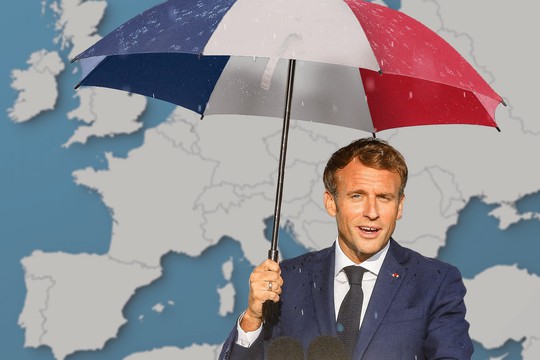Pic.: ‘Bulletin of the Atomic Scientists’
Break it gently to the French president, but it will take more than the French and U.K. nuclear deterrents to defend the Continent without the US, notes at POLITICO Derrick Wyatt is an emeritus professor of law at the University of Oxford.
In a key passage in his recent Sorbonne speech, French President Emmanuel Macron insisted that Russia must not win war in Ukraine. To meet the threat posed by Russian President Vladimir Putin’s nuclear weapons, he argued that Europe needed its own nuclear defenses. And on that front, he said, France could play a vital role.
The question is, could Macron be hinting at something similar to U.K. policy?
The U.K. is also a nuclear-weapons state, but unlike France, Britain has already spelled out its policy on using its nuclear deterrent in defense of its allies.
The U.K.’s nuclear warheads are mounted on Trident missiles launched by Vanguard-class submarines. And one of these submarines is always at sea, ready to launch its nuclear-armed missiles if ordered.
Yet, few seriously believe the U.K. would really launch nuclear missiles against Russian cities if Moscow had first attacked a NATO ally and not the U.K. directly.
For one, if Russia believed the U.K. had launched a nuclear attack on its cities, it would be highly likely to retaliate by launching a similar attack on the U.K. Also, the very act of a Vanguard submarine launching a Trident missile would risk revealing its location — information that could give Russia’s forces the opportunity to destroy it. And since the U.K. would likely have only one nuclear-armed submarine at sea, it could end up sacrificing its ability to respond to or deter a nuclear attack on its own shores.
So, whatever the U.K.’s official policy says, it’s close to inconceivable that Britain would use its nuclear weapons in case of an attack on a NATO ally rather than one on the U.K. itself. The Trident nuclear missiles may be an effective deterrent to nuclear strikes on the U.K., but they offer precious little protection to its allies.
France, meanwhile, has more nuclear weapons than the U.K., with most of its warheads deployed in its Le Triomphant-class submarines, and others on carrier or land-based aircraft. However, France has never “declared” or “assigned” its nuclear weapons to NATO. French nuclear weapons are there to defend France alone, and until recently, French governments never pretended otherwise.
To really understand what Macron was getting at in his Sorbonne speech, though, we must recall his Elysée speech from 2020, where he mentioned the use of French nuclear weapons. In that statement, Macron implied France might use them to defend European allies. He said nuclear deterrence was a last-resort guardian of the country’s vital interests, but he also added that these interests now had a European dimension.
Cutting through the somewhat Delphic style of these speeches, Macron seems to have suggested a carbon-copy of the U.K. policy. He is right, of course, to “smell the coffee” as regards the risks to European defense that would result from U.S. disengagement. One risk would be that Russia could dominate nonnuclear armed European allies with the threat or use of tactical nuclear weapons in any conflict.
Current Russian doctrine holds that lower-yield tactical (or battlefield) nuclear weapons are “a controllable means of achieving battlefield results and an end to hostilities.” According to recently leaked Russian documents, even the loss of conventional military assets, such as airfields, in a conflict could trigger a tactical nuclear response by Russia. And just a couple weeks ago, the Kremlin announced tactical nuclear weapons exercises to improve their readiness for combat.
This was a clear response to comments made by Macron and U.K. foreign minister David Cameron. Cameron had said it was up to Ukraine whether it used U.K.-donated weapons to hit targets in Russia, and Macron had floated the possibility of NATO troops fighting in Ukraine.
Without the U.S., Europe would simply have no in-kind response to Russia’s use of tactical nuclear weapons. And despite having a larger nuclear arsenal than the U.K., this would be the main factor that would militate against France launching a nuclear strike on Russia in defense of allies.
The nuclear umbrellas of France and Britain are real enough — but the truth is - they’re only wide enough to cover France and the U.K.
read more in our Telegram-channel https://t.me/The_International_Affairs

 11:46 20.05.2024 •
11:46 20.05.2024 •























